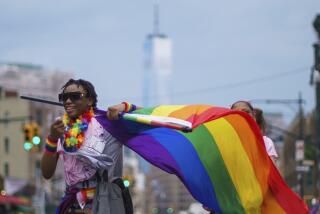Shaky Future for Statutes on Hate Crimes : High court has been asked to act on laws of 2 states imposing extra punishment for bias offenses.
- Share via
WASHINGTON — Over the past decade, at least half of the states have passed laws to punish “hate crimes.”
Some measures made it a crime to paint Nazi swastikas or burn crosses so as to anger or intimidate Jews and blacks. Other laws imposed stronger criminal penalties for thugs who attack blacks, gays, Jews or other people because of their race, religion or sexual orientation.
Now, however, recent Supreme Court rulings that expand the definition of freedom of speech have posed a threat to all of these hate-crime laws.
Three years ago, the court struck down the nation’s laws against flag-burning and ruled that the First Amendment protects even those acts that communicate loathsome messages. Based on that precedent, the justices in June declared unconstitutional a law against cross burning in St. Paul, Minn.
Speaking for a 5-4 majority, Justice Antonin Scalia said the laws may not be used to “selectively” punish certain offensive thoughts and ideas. His opinion cast doubt on whether the government can impose extra punishments on expressions of “bias-motivated hatred.”
Last summer, invoking Scalia’s opinion, state supreme courts in Wisconsin and Ohio struck down laws that imposed higher penalties for hate crimes.
Last month, however, the attorneys general from 31 states, including California, joined a series of civil rights groups in asking the high court to reconsider those decisions.
“Anyone is free to think bigoted thoughts or say bigoted things, but when those words and thoughts lead to criminal conduct, then we think the penalty can be enhanced,” said Steven M. Freeman of the Anti-Defamation League of the B’Nai B’rith.
BACKGROUND: On Oct. 7, 1989, a group of black teen-agers in Kenosha, Wis., gathered outside an apartment complex to talk about the movie “Mississippi Burning.” They were angered by a scene in which a white man beat a young black boy who was praying.
“Do you all feel hyped up to move on some white people?” asked Todd Mitchell, a leader of the group. When a 14-year-old white male came down the street, Mitchell pointed him out and said, “Go get him.” The white teen-ager was beaten unconscious and suffered brain damage.
Under Wisconsin law, prosecutors may seek a higher penalty for a criminal who “intentionally selects” his victim “because of the race, religion, color, disability, sexual orientation, national origin or ancestry of that person.” Mitchell was convicted of aggravated battery, which carries a two-year prison term. But the jury also found him guilty of violating the hate-crime statute. Based on this second conviction, he was sentenced to a total of four years in prison.
But when he appealed, the Wisconsin Supreme Court ruled unconstitutional the extra penalties in the hate-crimes law. This measure “threatens to chill free speech” because its punishments are based entirely on comments made by the perpetrator, the state court said. Everything from “ethnic jokes” to “serious intellectual inquiry” could be used later against a perpetrator, the judges said.
The government can punish criminal acts, they concluded, but it cannot impose greater punishments based on the “subjective mental process” of the criminal. The Ohio Supreme Court agreed and said the state was trying to punish a “thought crime.”
State prosecutors have urged the Supreme Court to hear the appeals in Wisconsin vs. Todd, 92-515, and Ohio vs. Wyant, 92-568. The justices may act next week.
OUTLOOK: The states stand a good chance of winning.
Four constitutional scholars recently predicted that the justices would uphold criminal punishments based on “discriminatory behavior.” The cross-burning law was struck down because it punished an act of expression, they said. By contrast, the Wisconsin-style law only punishes people who commit an undeniable crime, such as an assault.
Four justices--Byron White, Harry Blackmun, John Paul Stevens and Sandra Day O’Connor--also said they reject Scalia’s broad opinion. If one other member of the court joins them, they will have a majority.
However, if the court endorses the rulings from Wisconsin and Ohio, a series of other civil rights laws also would be in danger.
For example, the laws against sexual harassment presume that a person’s sexist comments can be used against him. Even the Civil Rights Act of 1964 could be jeopardized. It outlaws discriminatory behavior by employers. These cases often turn on comments that show bias. Could such comments be protected as “freedom of speech”?
Observers think the justices will avoid this morass and simply make clear that states can punish crimes based on bias and hate.
More to Read
Sign up for Essential California
The most important California stories and recommendations in your inbox every morning.
You may occasionally receive promotional content from the Los Angeles Times.













